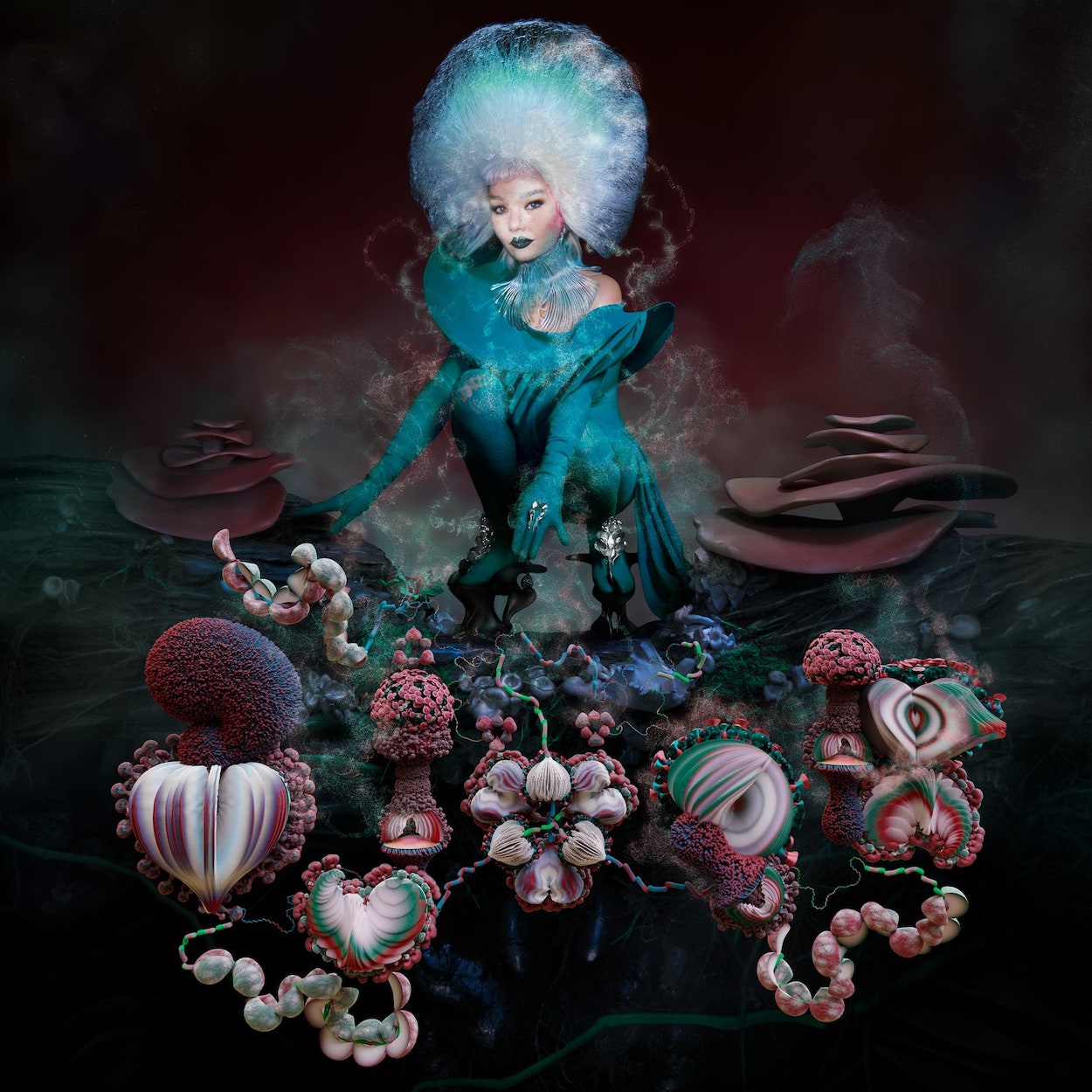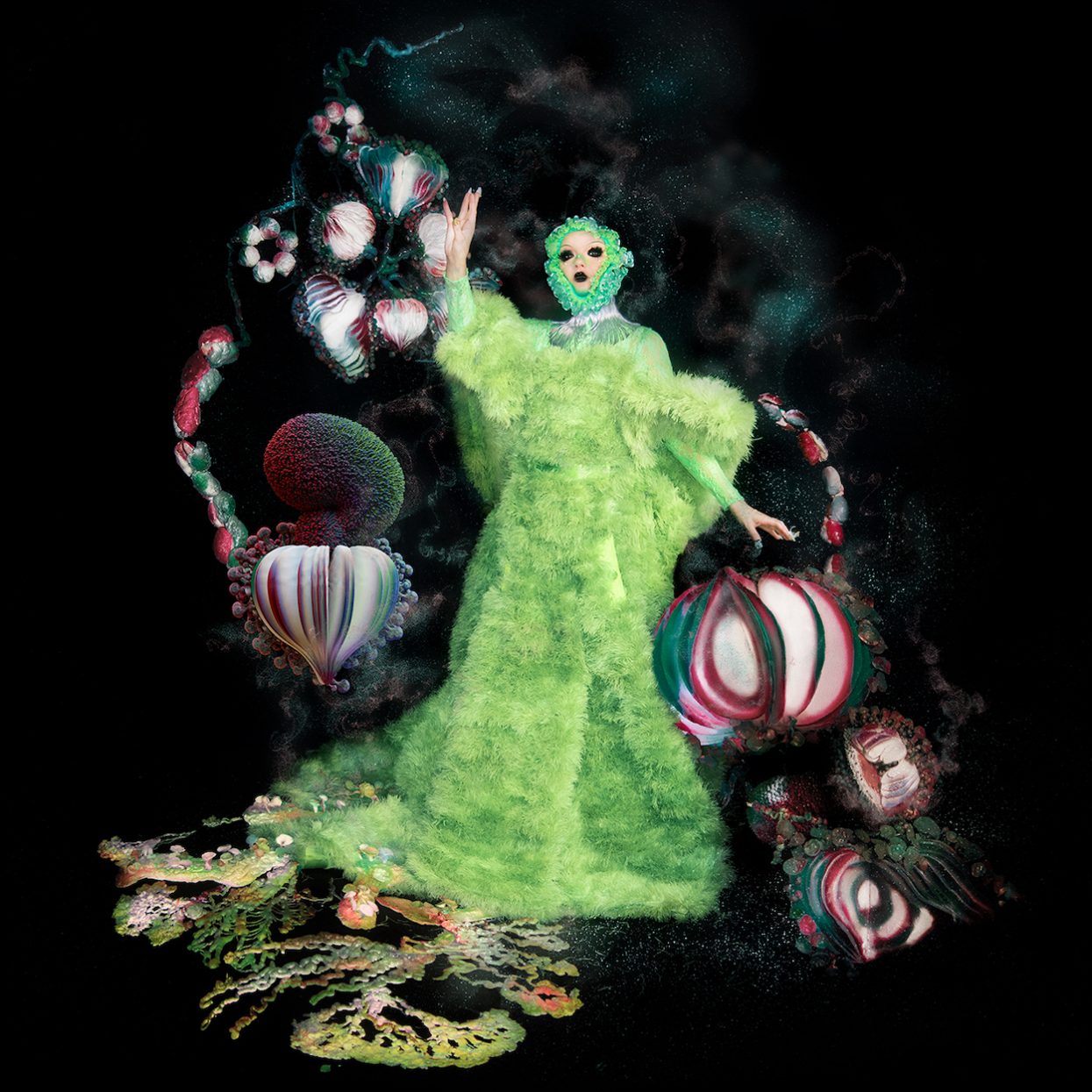Björk’s discography has always been about world-building and revealing the universes that exist within. Homogenic (1997) portrayed her as an icy warrior queen, draped in a satin Alexander McQueen gown, rushing into emotional extremes of melancholy, fury, and transcendence inherent in Mark Bell’s sizzling production. The nature-themed Biophilia (2011) accompanied an iPad app and documentary that served as a clarion call for environmentalism. Awash in flute and birdsong, Utopia (2017) gloriously extols the emotional highs of Tinder-fueled romance—a rebound after chronicling her traumatic divorce from artist Matthew Barney on the heart-wrenching, string-laden Vulnicura (2015).
If the Icelandic avant-pop singer’s visions have always soared into the atmosphere, her newly released tenth studio album Fossora brings them back to earth. The title, derived from Latin, loosely means “she who digs”—and here Björk delves into the circle of life, parental love, and physicality, her ruminations made all the more striking when backdropped by low-register instruments like trombones and bass clarinets. She describes it as her “Iceland” album, sonically rooted in the island nation’s folk and choral traditions, but visually she plumbs inspiration from the underground fungal networks that break down pollutants and create new life from decomposing matter.
“It’s something that lives underground, but not tree roots,” Björk tells Pitchfork about the album’s fungus metaphor. “A tree root album would be quite severe and stoic, but mushrooms are psychedelic and they pop up everywhere. My fungus period has been bubbly and fun, with a lot of dancing.” Fossora’s visuals paint a hyper-vivid portrait of Björk fully immersed in her mushroom era. On the cover, she perches superhero-style atop a network of brilliant subterranean spores blossoming underfoot. Adorning her head, a wig by Tomihiro Kono resembles mycelium. She’s draped in a bodysuit dress by Paris-based designer Jisoo Baik, whose signature dramatic folds and wired arcs resemble a biological sculpture. “There’s a woman within it, but her body is obscured because the design creates a protective barrier between her and the world,” Baik tells Dazed. “It’s about creating a space made for a mysterious woman who is both strong and fragile, whose courage allows her to act adventurously in the face of danger.”
Danger was fully on Björk’s mind when Fossora was still germinating. She returned to her hometown Reykjavik to record during lockdown—a move motivated in part to escape the frequent scourge of gun violence in the United States and former President Donald Trump’s decision to withdraw from the Paris Climate Accord. To distract herself, she watched nature documentaries like Netflix’s Fantastic Fungi, becoming enamored with its magical time lapse footage of mushrooms slowly overtaking their surroundings. The 2018 death of her environmental activist mother also inspired her to look inward, yielding solemn tracks like the anthemic eulogy “Ancestress” and the nearly a cappella “Sorrowful Soil,” whose reflections on the sacrifice of motherhood soar thanks to women’s voices from the Hamrahlid Choir.
Bringing the album to life is Icelandic photographer Viðar Logi, who shot the cover in Björk’s secluded cabin 40 minutes outside Reykjavik, described as a “picturesque rave space” for her collaborators. Logi also directed the vivid music video for lead single “Atopos,” whose Barthes-inspired lyrics about collective optimism and impending doom are buoyed by forceful “biological techno” rhythms and honking clarinets. Instead of relying on CGI to animate the artwork and video’s opulent fungal environs, set designer Heimir Sverrisson painstakingly built and installed each mushroom by hand. It echoes Fossora’s underlying message: sometimes the most rewarding revelations come when you get your hands dirty.


